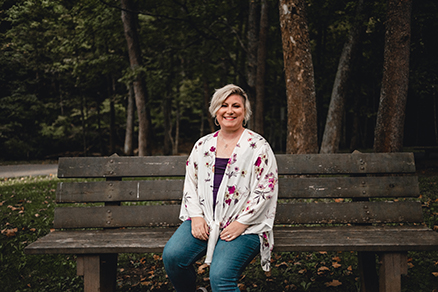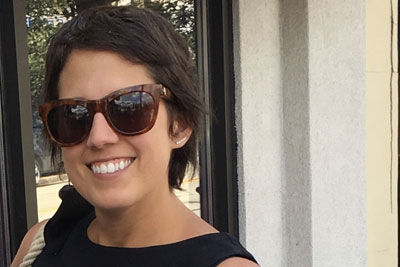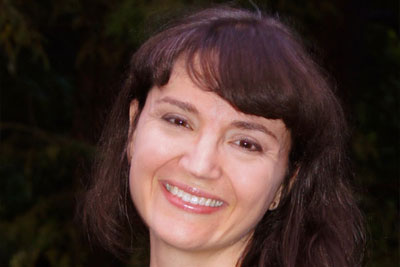Kim


A cancer diagnosis isn’t easy for anyone to go through. Every situation is different. We may be married or single, with or without children, working or not working. With breast cancer striking women as young as their teens, we are also all ages.
I was at work on April 18, 2017, when I learned that I had pre-menopausal breast cancer. So many questions went through my head – how do I “do” cancer by myself? Will I be able to work? How will I get to appointments? Should I tell people?
My mom and stepmom are both breast cancer survivors. They had very different treatment plans, but I knew it would be a difficult journey. I felt so alone. How would I be able to do everything without consistent help?
My relatives were scattered around the eastern side of the US and my “in-person” network felt limited. My brother and friends had full time jobs – I didn’t want to ask them to use vacation time to help me. I would have people to help me emotionally, but the day-to-day things would likely be challenging.
I read everything I could about breast cancer. Articles stressed the importance of bringing someone to appointments. In fact, the cancer guidebook that I received from my surgeon began with chapters on how to involve your spouse and what should you tell your children. The book included two pages on the single woman and future intimacy, but nothing about how to go through cancer without someone physically there by your side. I started to feel like I was the first single woman to ever get cancer!
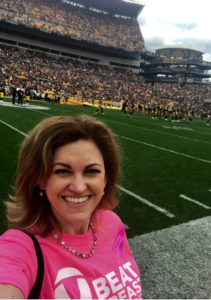
I quickly learned why cancer patients are called Warriors. I went to my appointments solo, armed with lists of questions and a notebook. I took notes – lots of notes. I spent hours on the phone with my insurance provider fighting to get tests covered. I quickly added a calendar to my supplies so that I could keep track of all of my appointments.
In the meantime, I started to tell a few friends. I am a member of the Mt. Lebanon Junior Women’s Club (MLJWC), and they asked me to tell my story at a meeting. A member connected me to the Young Women’s Breast Cancer Awareness Foundation (YWBCAF), a group the MLJWC had supported a few years before. Another young survivor recommended a Facebook group for local women under 50 with cancer. I discovered the Young Survival Coalition (YSC), an international group for pre-menopausal women with breast cancer, and attended my first YSC local dinner, where I met other survivors my age.
I wasn’t sure that I needed a support group – I was too busy working and dealing with cancer to go to what I thought would be a depressing experience. However, I took an evening to attend a dinner. I met the most amazing women in all stages of treatment. I left with an instant network of friends – very well informed and supportive friends.
Going through breast cancer teaches you so much.
I learned that support groups are valuable. If you ever go through a serious illness, take the time to find a group that is right for you. These women helped to save my life.
I learned that many people are willing to help. I discovered a network of caring neighbors who provided emotional support and home-cooked dinners. I continued to serve as a MLJWC executive board member the best I could while balancing work and treatment; their Helping Hands committee provided meals and care packages, rides to meetings, and visits when I was down.
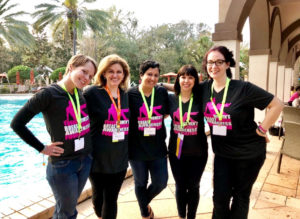
I learned that some people will disappear – not everyone can handle cancer. I won’t lie – it hurts when people you expect to be there are not. I finally let them go and put my energy into my treatment. This is the time to focus on you.
I learned that other people will appear – I received cards, emails, and small gifts from people I hadn’t seen in years. Women who I didn’t know well became friends and replaced those who left.
I discovered guided meditation, Yoga4Cancer, reiki, acupuncture, and other mindfulness activities. Self-care helps!
I learned that your treatment plan might change several times as your medical team learns more about your unique cancer. However, you are your best advocate, and you must educate yourself enough about your condition to know when to seek out additional expertise.
I learned that sometimes it takes a third or fourth medical opinion. I switched to a new medical team mid-treatment to obtain better-aligned resources. My new team was able to finalize a treatment plan within a week, and I was lucky enough to have access to the specialized prone radiation approach required to avoid my heart and lungs, which were in the path of traditional radiation.
I learned that not everyone who goes through cancer looks sick. We take great care to look as normal as we can. You truly never know what the stranger next to you is going through.
I learned that it is possible to date during cancer. Around the time I was diagnosed, I met a wonderful man. He became a huge help during treatment and beyond. A year and a half later, we are still dating.
I learned that resources are available regardless of income. Cancer social workers exist to help people connect with needed services, and everyone’s needs are different.
I learned that many women who go through cancer treatment feel alone regardless of whether they are single or married. However, there is a rule of sorts with cancer – pass on what you know and be there for others.
In the midst of all of the fear of cancer, we support each other, whether in person or on-line, near or far. We try to have fun when we can. With other survivors, I led the Terrible Towel wave at the Steelers Crucial Catch game and walked through a human tunnel at the WFA All-Star game. You definitely feel like a Warrior with a pro athlete cheering you on!
I learned that I am lucky. I was diagnosed Stage 1a, and had the most common, most treatable, and most researched form of cancer. I am taking steps to try to ensure a healthy future. I am No Evidence of Disease (NED) at the time of writing this article.
But, I also learned that not everyone makes it through regardless of how hard he or she fights. I bonded with Katie at the Steelers Crucial Catch game. At the time, she was NED; a few months later, she had a metastatic recurrence. I found out that she passed away just a few minutes before my mom and stepdad arrived from Florida for a visit. I was never so happy to have my mom hug me as I cried – one survivor supporting another is what this is all about. We need a cure so that the children of all of the Katies out there can hug their moms.


